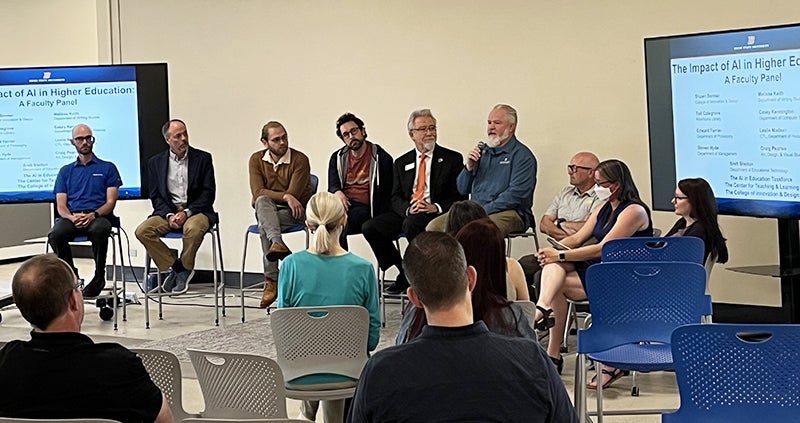
While artificial intelligence tools like ChatGPT make writing assignments and basic research quicker and easier for students, educators grapple with issues like plagiarism and how to understand and meaningfully incorporate this relatively new and readily available technology in the classroom.
Professors Brett Shelton and Andy Hung from the Department of Educational Technology have quickly developed novel ways to support educators in thinking about and using artificial intelligence tools in higher education settings and beyond.
Shelton recently participated in a cross-disciplinary panel discussion hosted by the Center for Teaching and Learning at Boise State and Hung is offering a summer course on fundamental machine learning methods in education where ChatGPT will serve as his teaching assistant.
The panel discussion included educators from areas of professional writing, philosophy, computer science, libraries, innovation and design and educational technology. The discussion provided an overview of how natural language processing programs are developed and refined, the use of these tools from both a teacher and student perspective, and current practices of leveraging these tools for effective learning. Shelton’s perspective on the panel included encouragement for educators to better design their lessons given ChatGPT’s benefits and drawbacks.
“The widespread development and use of AI will have a far greater impact in education than Covid did,” Shelton said. “We educators cannot sleepwalk through this new era and go from here to ‘back to normal’. Educators will be required to see how to better personalize and contextualize their lessons.”

Hung’s course, offered for the first time in summer 2023, is designed for beginners using machine learning for programming tasks. The course covers the most popular algorithms in the Learning Analytics and Educational Data Mining disciplines, which are used to gather knowledge from analyzing a large amount of educational data. In addition to “being” the teaching assistant for the course, ChatGPT will assist students with programming for data analysis.
“With the support of ChatGPT, I can focus on more in-depth discussions and design more advanced tasks, rather than spending my time debugging programming issues for students,” Hung said. “By the end of the course, students will be able to navigate the general analytic flow in machine learning, optimize models automatically and construct their own models with limited programming skills.”